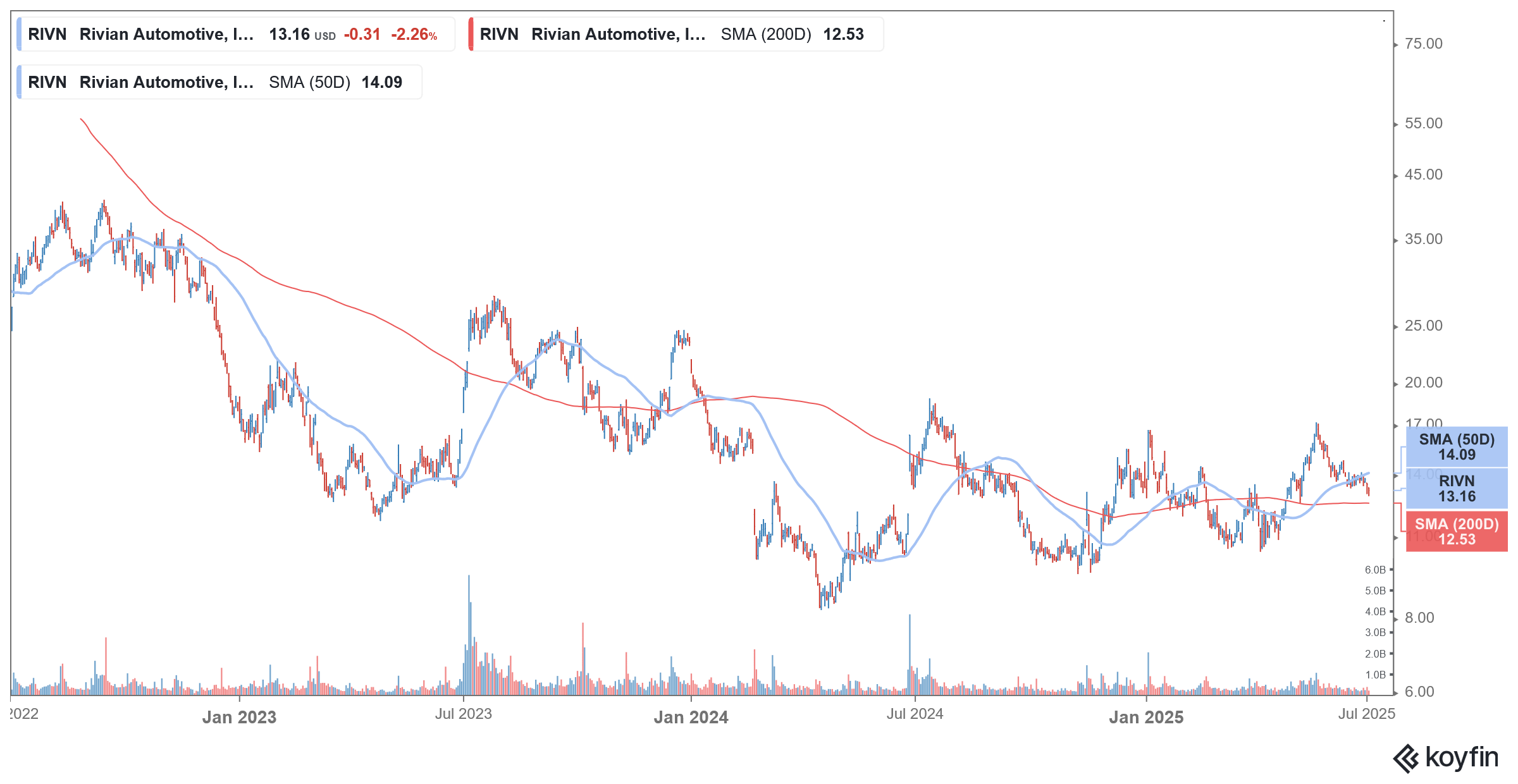Rivian Stock Falls After Reporting Sharp Fall in Q2 Deliveries
Please note that we are not authorised to provide any investment advice. The content on this page is for information purposes only.
Rivian stock (NYSE: RIVN) is trading sharply lower today after the company reported a 22.7% fall in its Q2 deliveries. Here are the key takeaways from the report and how it stacks against other electric vehicle (EV) companies.
Rivian delivered 10,661 vehicles in Q2 but produced only 5,979 due to production bottlenecks. Both these numbers, especially the production, fell short of estimates.
Rivian Reports Sharp Fall in Q2 Deliveries
Despite the temporary production constraints in Q2 2025 due to retooling and preparations for new models, Rivian has reaffirmed its full-year 2025 delivery guidance, targeting between 40,000 and 46,000 vehicles.
EV rival Lucid Motors is yet to release its Q2 deliveries, while Tesla reported a 14% YoY fall in deliveries. It is the second consecutive quarter when the company’s deliveries fell in double digits. Meanwhile, while US companies are witnessing a slowdown in EV sales, Chinese EV companies reported strong growth in the quarter. Along with the domestic markets, Chinese EV companies are also targeting global markets despite tariffs in several countries.
Volkswagen Invests Another $1 Billion in Rivian
Rivian also announced that Volkswagen has invested another $1 billion in the company. The investment is part of the previously announced $5.8 billion investment that Volkswagen announced last year. The agreement is expected to bolster Rivian’s financial position and facilitate cost reductions through joint component sourcing. This strategic partnership is crucial for Rivian as it continues its path towards profitability.
During their Q4 2024 earnings call, Rivian said that it expects to realize revenues of $2 billion from Volkswagen over the next four years as their joint ventures deliver on the pre-set milestones. This, Rivian said, would include the cash received from Volkswagen for licensing of intellectual property, coupled with equity premiums and other noncash benefits.
Volkswagen Has Partnered with EV Startups
Along with developing EV cars, Volkswagen has also partnered with other companies to bolster its position. In 2023, Volkswagen partnered with Xpeng Motors to build two EVs on its platform and also bought a stake in the company for a total consideration of $700 million. The deal was a pathbreaker for not only XPEV but also the Chinese EV ecosystem, as it reflected the confidence of the German auto giant in a startup EV company. It was also a testimony to Xpeng Motor’s self-driving capabilities. The two companies have expanded their partnership and last year announced a joint sourcing program to cut down on costs.
Volkswagen also invested in solid-state battery startup QuantumScape. Solid-state batteries promise faster charging, higher range, and longer life, which can help increase EV adoption.
Rivian Has Posted Gross Profits for Two Quarters
In Q1 2025, Rivian posted a positive gross profit of $206 million, marking the second consecutive quarter of positive gross profit and its highest to date. It was a substantial improvement from a gross loss of $527 million in Q1 2024. Of this, $92 million came from automotive and $114 million from software and services.
However, President Donald Trump’s policies could hamper Rivian’s push for profitability. While Rivian manufactures its vehicles entirely in the U.S. (Normal, Illinois), its supply chain is still global. Rivian’s CEO, RJ Scaringe, has stated that Trump’s tariffs are adding a “couple of thousand dollars” to the cost of each vehicle. This is due to components like battery cells, steel, and aluminum that still rely on international sourcing, even if the final assembly is domestic.
The EV tax credits also look set to go. These credits have been a key driver of EV adoption by making them more affordable for consumers. If these are removed or significantly scaled back, it could dampen consumer demand for all EVs, including Rivian’s higher-priced vehicles.
Rivian To Produce Low-Cost Model R2 in 2026
Rivian is set to launch its low-cost platform R2 in the first half of 2026 and previously said that the bill of materials (BOM) for the model would be half of the R1 series of vehicles that it currently sells.
The R2 is designed to be a more compact and affordable alternative to Rivian’s current R1T pickup and R1S SUV. It will start at around $45,000, significantly lower than the R1 models. This price point aims to compete more directly with popular EVs like the Tesla Model Y, which was the best-selling car across EVs as well as internal combustion engine cars last year.
The R2 is critical for Rivian’s long-term success and profitability. By offering a more affordable and mainstream EV, Rivian aims to attract a larger customer base beyond the niche premium segment. Moreover, the model would help drive higher production volumes, which is essential for achieving economies of scale and improving gross margins.
Tesla is Also Working on a Low-Cost Model
Notably, Tesla also achieved scale (and profitability) with its mass market Model 3 and Model Y. The company is now working on a new low-cost model, which would be priced below its current range.
With a flurry of companies working on affordable EV models, the competition in that space is set to intensify. This might lead to an escalating price war as these models compete for market share. There is some economic rationale behind companies cutting prices. For instance, as production volumes increase, manufacturers achieve greater economies of scale. Fixed costs are spread over more units, further reducing the per-vehicle production cost.
Moreover, as market leader, Tesla cut costs; other players like Rivian were forced to lower prices to stay competitive. However, while Tesla’s profitable and cash-generating operations give it the leeway to cut prices, EV startups are already saddled with losses and cash burn.






